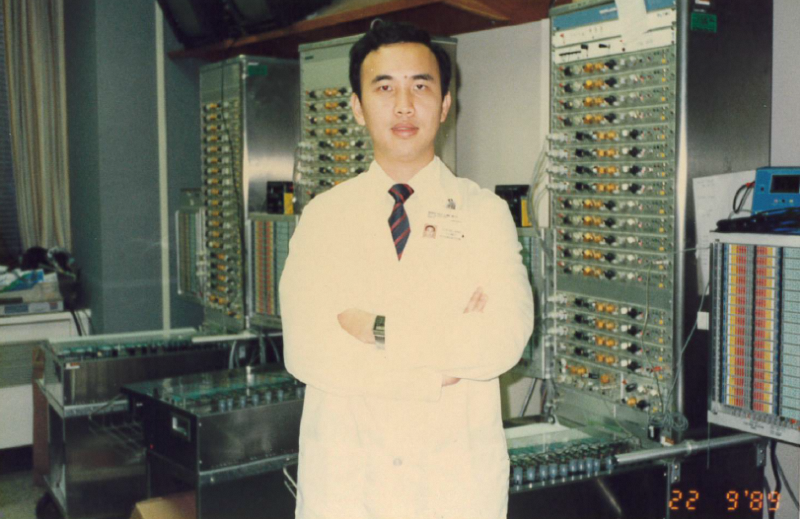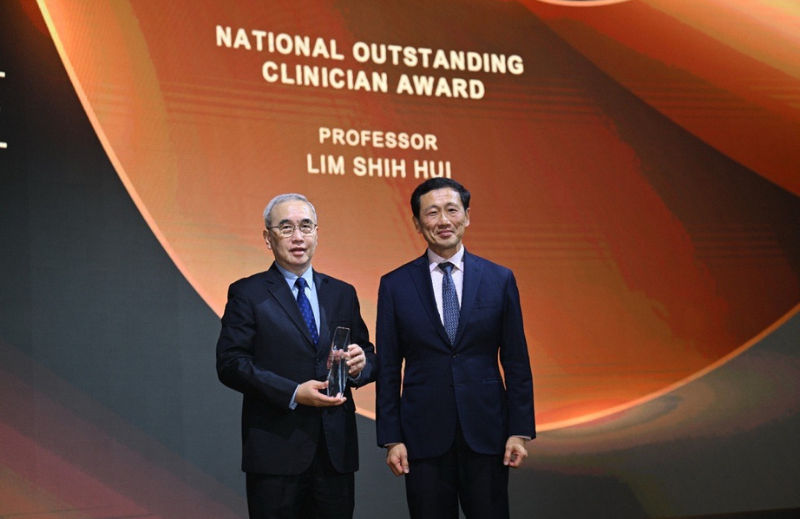Professor Lim Shih Hui has received the National Medical Excellence Award (NMEA) National Outstanding Clinician Award 2025 for his clinical excellence in neurology and outstanding leadership in advancing professional standards in Western and Chinese Medicine. This is the second NMEA for Prof Lim, Senior Consultant Neurologist, NNI, recognising the impact he has made on Singapore healthcare.
In the world of medicine, Professor Lim Shih Hui stands as a rare exception – an accomplished neurologist specialising in epilepsy, who has spent more than 30 years masterfully bridging Western neurology and Traditional Chinese Medicine (TCM) whilst elevating healthcare standards across Singapore and the Asia-Pacific region.
The Neurologist Who Saw Beyond Boundaries
Professor Lim's journey began in the challenging field of neurology, where he developed a refreshingly simple approach to what many consider an intimidatingly complex specialty. "Neurology may seem difficult at first, but all things are difficult at first!" he explains. His methodology centres on four fundamental questions: What are the symptoms? Where is the problem? What is the cause? And what can you do about it? This systematic approach has guided not only his clinical practice but his entire career philosophy.

Prof Lim using a reflex hammer to identify abnormalities in the central or peripheral nervous system
With over 35 years of experience managing patients with epilepsy, Professor Lim has consistently pushed boundaries. In the 1990s, when anti-seizure medications were limited, he pioneered the Epilepsy Surgery Programme, evaluating more than 100 patients who underwent surgery, resulting in significantly fewer seizures and improved quality of life.
Certified by the American Board of Clinical Neurophysiology in 1990, he set out to ensure consistent, high standards in electroencephalography (EEG) interpretation and reporting, both in Singapore and the region. EEG is a medical test that records brain electrical activity, and accurate reading is essential for the diagnosis and management of seizures and epilepsy. He subsequently introduced other essential tests as part of the pre-surgical evaluation. This included the Intracarotid Amobarbital Test (or WADA Test) to determine which half of the brain was dominant for language as well as to test memory function of both halves. He also introduced intracranial EEG evaluation, by inserting special EEG electrodes on the surface or deep within the brain through craniotomy, recording brain waves, and performing brain stimulation. With these tests, he was able to precisely locate the epileptic lesion and identify critical brain areas before resection surgery.
Prof Lim established an EEG Certification Examination under the auspices of the ASEAN Neurological Association (ASNA) and the Asian Epilepsy Academy, which has been the gold standard for EEG practice across Asia and Oceania the last 20 years. Close to 1,000 adult and paediatric neurologists, clinicians, EEG technologists and others have attempted this examination, with approximately 400 obtaining the certification.
The East-West Medical Pioneer
"Prof Lim is like the Lewis Hamilton of healthcare - he's always ahead of the curve!"Dr Prakash Kumar Manharlal, Head and Senior Consultant, Department of Neurology, NNI@SGH and colleague of Prof Lim for more than two decades.
What truly sets Professor Lim apart is his prescient recognition of TCM's value decades before integrative medicine became mainstream. In the 1990s, acknowledging the limitations of Western medicine for certain neurological conditions, he embarked on a three-year journey to master acupuncture. This decision would prove transformative, not just for his practice but for Singapore's healthcare landscape.
"Learning acupuncture in the 1990s made me a better neurologist," Professor Lim reflects. The four diagnostic methods of TCM - 望 闻 问 切 which are inspection, auscultation and olfaction, inquiry, and palpation - enhanced his clinical skills, teaching him to observe patterns more carefully, listen more than he speaks, ask the right questions, and identify root causes. These ancient practices complemented his Western clinical training, enabling more comprehensive patient assessments.
His motivation was deeply rooted in patient care. "Many patients and their caregivers expressed their unhappiness that there were no good medications to reverse the neurological deficits after having a stroke," he recalls. "There were also many neurological conditions, including migraine, neuralgia, and seizures, that had effective medications, but patients developed unacceptable side effects." These clinical limitations prompted him to explore the combination of TCM with Western medicine to achieve better outcomes.
In 1998, he established the Acupuncture Unit at Singapore General Hospital, witnessing firsthand the value of integrating TCM into Western practices, particularly for post-stroke rehabilitation and painful neurological conditions. This early work put him in good stead for his later appointment as Head of the Traditional and Complementary Medicine Branch at the Ministry of Health in 2020, as well as the Registrar of the TCM Practitioners’ Board.
From Practitioner to Educator to Administrator
Professor Lim's career exemplifies the evolution of a complete clinician. "Actually, we are all clinicians," he observes. "Sometimes we are clinician practitioners, other times we are clinician educators, as well as clinician researchers, clinician administrators, clinician leaders, and/or clinician innovators." His philosophy is that good practitioners must also be good educators, and vice versa
.His approach to education is deeply personal. "If those whom I teach do not eventually become better than me, I have failed in my attempt to educate them," he states, reflecting his commitment to nurturing the next generation.
Dr Tan Zhibin, Associate Consultant, Neurology, NNI, is one of several generations of doctors who have benefited from Prof Lim’s teaching and guidance. “Three things stand out in Prof Lim: Compassion and respect for his patients and colleagues, a keen attention to detail, and his uncanny ability to vitalise seemingly mundane subjects. His mentorship has been and continues to be formative for me,” says Dr Tan.
Prof Lim’s administrative journey reflects the ancient Chinese medical proverb:上医治国,中医治人,下医治病
Superior clinicians treat countries, average clinicians treat people with diseases, whilst inferior clinicians treat diseases.
"Perhaps I was an inferior clinician in my initial 10 to 20 years of my career, as I was focusing on treating diseases," he reflects. "I became an average clinician from 2000s, when I paid attention to treating people with the diseases, and for the last 10-15 years, I have focused on making changes at the national level."
Elevating Standards Across Two Medical Tradition
sProfessor Lim's leadership extends far beyond clinical practice. As Head of the Traditional and Complementary Medicine Branch, he has been instrumental in elevating TCM standards and integrating evidence-based TCM practices into Singapore's healthcare system. His initiatives include deve'oping Career and Remuneration Guidelines for TCM practitioners, launching the TCM Clinical Training Programme, and facilitating regulatory sandboxes to test new models of care.
A Personal Journey of Growth
Professor Lim's path to excellence wasn't always smooth. "I was a C/D/E grader in junior college and medical school," he admits candidly. "I began to learn to get better scores in my postgraduate studies when preparing for my Master of Medicine and MRCP examination, EEG Exam, TCM Exam, and during his MBA study." His transformation from struggling student to full professor demonstrates that "everyone has a chance to excel in their own field" - a message of hope he shares with younger generations of Singapore medical professionals.

Prof Lim launched the ASEAN Neurological Association (ASNA) and Asian Epilepsy Academy (ASEPA) EEG Certification Examination in Asia and Australia.
Looking Towards the Future
As Singapore’s healthcare system evolves with artificial intelligence and advanced technology, Professor Lim remains optimistic yet cautious. He envisions AI analysing millions of patient records continuously, enabling faster disease detection and more targeted treatments for Singapore's population. However, he firmly believes that AI and existing neurodiagnostic including neuro-imaging cannot replace a clinician’s evaluation and acumen. “The true value of a clinician lies in mastering the basic principles and fundamental skills of clinical examination, because we are treating humans, not machines!” says Prof Lim.
This forward-thinking approach to healthcare innovation highlights the visionary leadership that earned Professor Lim his recent National Outstanding Clinician Award 2025 and widespread recognition throughout his career. His numerous accolades reflect this comprehensive impact: the NMEA National Outstanding Clinician Educator Award in 2015, the Outstanding Fellow Award from the College of Physicians Singapore in 2024, and an Honorary Fellowship from the Academy of Chinese Medicine Singapore, acknowledging his three decades of pioneering TCM work.

Prof Lim receiving his NMEA Award 2025 from Minister Ong Ye Kung
The Human Touch in Healthcare Leadership
Despite his impressive achievements, Professor Lim remains grounded in what truly matters. During his acceptance speech at the NMEA 2025 Award ceremony, Prof Lim thanked his family for supporting him throughout his career.Prof Lim said: “The joy of receiving awards, though good, can never be the same as having good health and a harmonious family life. While I deeply appreciate this award, I'm afraid it is not my greatest achievement nor my proudest moment – that honour goes to being promoted to the rank of grandfather 4 years ago!"



















